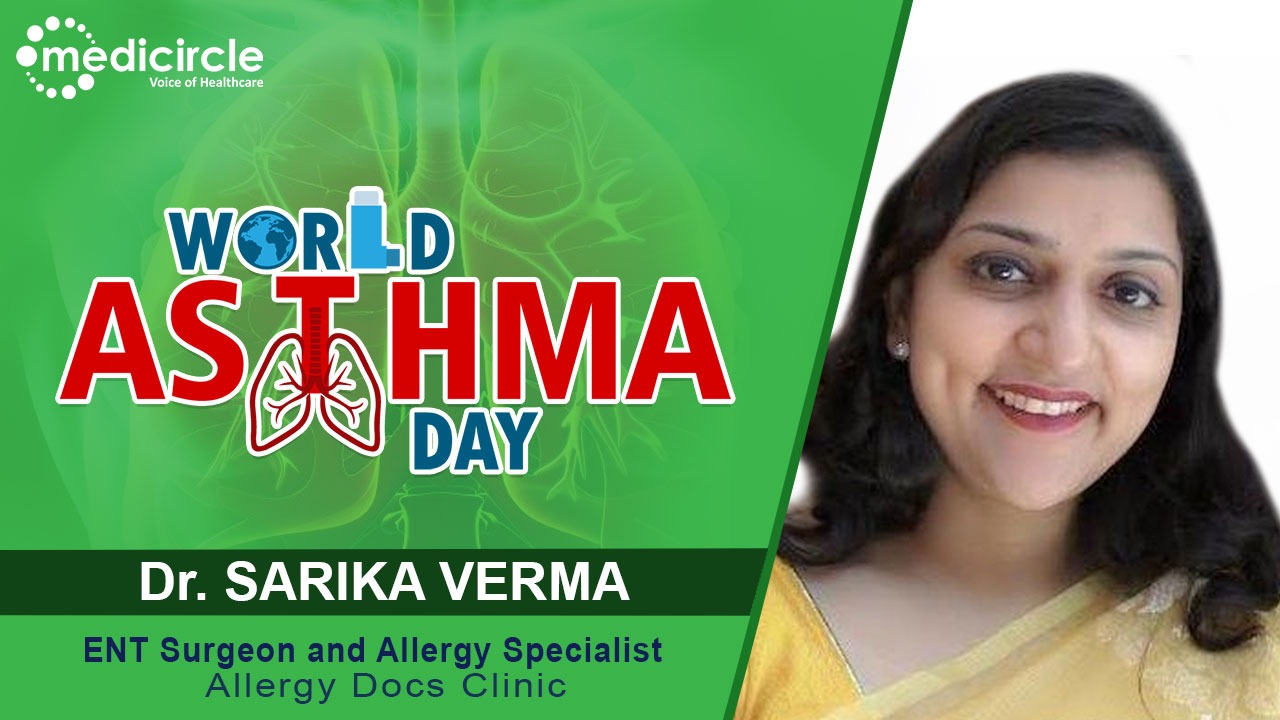Asthma is an inflammation and obstruction of the bronchial tubes, a passage that allows air to enter and leave the lungs. During an asthma attack, muscles surrounding bronchial tubes constrict, narrowing the air passage, making it difficult to breathe. The duration of the attack may vary depending upon the cause. At Medicircle, on the occasion of World Asthma Day, we are speaking to eminent Pulmonologists, Respiratory therapists, Paediatricians to build awareness regarding respiratory-related diseases and their available treatments.
Dr.Sarika Verma is an ENT surgeon and allergy specialist. She is a Director of AllergyDocs Clinic. She is heading the chains of 10 AllergyDocs Clinics in five big cities Mumbai, Delhi, Gurgaon, Chandigarh, and Udaipur.
How to know that you have asthma
Dr.Sarika Verma says, “For a layperson, asthma is breathlessness. When you have asthma, you have constriction of airways with wheeze breathing, noisy breathing. When you have exploratory Ronchi, it is called asthma.
There are higher chances of a history of chronic bronchitis for several months that leads to asthma. Bronchitis may be intermittent or seasonal. Asthma occurs due to the recurrence of breathlessness attacks many times. Otherwise, it is called bronchitis or Hyperactive airways disease.”
Symptoms of asthma
Dr.Verma informs, “The detection is usually by taking a history of the patient when the patient complains of following
Difficulty in breathing Cough at night 2-4 am Constriction of airways more on sleeping and lying down Nebuliser relieves the symptoms These are clinical ways to identify when an examination of the chest with a stethoscope the doctor hears “rhonchi” or noisy breathing which is a classical symptom of asthma. Spirometry tests can also be done to diagnose asthma which is quite expensive which is done before and after taking medicines. The expiratory rate is checked accordingly which is very technical. Even your respiratory rate is better with inhalers in spirometry test is typically diagnostic of asthma
Types of asthma
Dr.Verma states,” The type of asthma is as follows:
Seasonal Persistent Allergic
Symptoms of asthma in children
Dr.Verma states, “Any person who has difficulty in breathing or coughing should definitely check with the doctor in regards to the oxygenation of lungs. If the lungs are ok, then a cardiac check-up is needed. In children, the symptoms of asthma are
Weak cough reflux Weakness Lethargy Tiredness of coughing Indrawing of rib muscles Accessory muscles of respiratory muscles are visible
Dr.Verma says, “If these symptoms are visible in the child, it is time to consult the pediatrician for asthma to start treatment at an early stage to avoid the hospitalization of the child. Many parents try to avoid nebulizations for children thinking that they will get habitual to it. This is a wrong misconception. India is one of the most polluted countries, ranking in the top 15 cities. It is very sad to know that children are living in such polluted cities and pollution affects every part of the body including thinking, and lung capacity.”
A comparison study of the lung capacity of Urban children V/S Rural children
Dr.Verma says, “A study has been done for comparison of pollution for Urban children V/s Rural children and it has been noticed that urban children have reduced lung capacity because of polluted air. Allergic asthma symptoms are as follows
Nocturnal cough is a very classical symptom of allergic asthma Sneezing in the morning 10 - 15 sneezes/morning
Single airway single disease: Controlling your nose allergy will help in calming effects on the rest of the lungs. The asthmatic attacks and severity of asthma will get reduced. The airways in the nose and lungs are slime by ciliated columnar epithelium.”
Treatment for asthma
Dr.Verma says, “Asthma can be managed at 3 levels:
Medical management.
Seasonal asthma can be taken care of in patients who are prone to asthmatic attacks on Feb or October 2021 with a strong history of seasonal asthma. Such patients should start with anti-allergic medicines proactively 8 - 10 before the start of symptoms.
Anti Allergic tablet. Bronchodilators
Inhalers: The mainstay of asthma treatment are inhalers
Pump Capsules Rota inhaler Nebulizer “
Inhalers are drugs of choice for asthma
Dr.Verma says, “Many patients prefer the medicines and syrup. Inhalers are the safest medicine for asthma. The body takes time to metabolize the medications when taken orally. But, on the other hand, inhalers are in low doses and directly reach the target organs which are the lungs. Inhaler medications are microscopic and the systemic absorption is negligible. Inhalers are not habit-forming. Inhaled steroids and bronchodilators are life-saving. Inhalers are safe for pregnancy and children. Allergy is treatable with medications and inhalers. Identify the allergens with allergy tests and treat them with Immunotherapy. Asthma is controllable and treatable.”
(Edited by Dr.Rati Parwani)

 Dr.Sarika Verma cleared the myths about the use of inhalers in asthma. She confirms that inhalers can be life-saving and is the mainstay of the Asthmatic treatment
Dr.Sarika Verma cleared the myths about the use of inhalers in asthma. She confirms that inhalers can be life-saving and is the mainstay of the Asthmatic treatment









.jpeg)


.jpg)







.jpeg)

.jpg)




.jpg)




.png)

